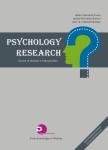Constructive Cognition as Positive Behaviour
Constructive Cognition as Positive Behaviour作者机构:Indian Institute of Public Administration New Delhi India
出 版 物:《Psychology Research》 (心理学研究:英文版)
年 卷 期:2013年第3卷第4期
页 面:199-205页
学科分类:0402[教育学-心理学(可授教育学、理学学位)] 04[教育学] 081401[工学-岩土工程] 08[工学] 0814[工学-土木工程]
主 题:性行为 情感空间 周围环境 人类行为 心理学家 神经科学 认知心理学 青少年
摘 要:Emotion and cognition are inter-related variable influenced by environment and individual constructive ability. Review of researches done in this area would help in understanding of emotional bearing and influence on human behaviour. This is intended to explore in the present paper. Emotion plays an important role in constructive cognition. It is found that academic goal pursuit among young adolescents depends much on their emotional intelligence and adaptive skills. How one finds the immediate environment as supportive or oppressive will depend on the individual constructive cognition and influence future actions in dealing with the situation. Recent years, it has witnessed a revival of research in the interplay between cognition and emotion. Emotion theorists have recognized the pivotal role of cognitive factors in virtually all aspects of the emotion process. They rely on basic cognitive factors and insight in creating new models of affective space. Also, the successful application of cognitive therapies to affective disorders has prompted clinical psychologists to work towards a clearer understanding of the connections between cognitive processes and emotional problems. An analytical review of studies is presented to explain individual differences in cognitive achievement and emotional adaptation in adolescents. Gender differences, culture, and school environment are studied as independent variables. Development of cognitive psychology and neuroscience in the areas of cognitive and emotional behaviour made many contributions to the understanding of the positive and negative correlates of human behaviour, neural processes, and their implications in the daily lives of the people. Based on these new challenges and emerging nuances of positive psychology, the present paper deals with empirical data-based researches in the area of development of constructive cognition in shaping positive behaviour and healthy society.



